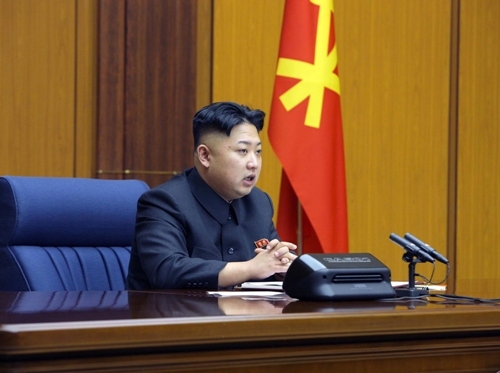U.N. Council to take strong action against N. Korea's nuke test
Seoul, Washington discuss new measures to punish Pyongyang's provocation
By 윤민식Published : Feb. 5, 2013 - 08:56

The U.N. Security Council will take “very stern and strong” action should North Korea carry out another nuclear test, Seoul’s top envoy to the international organization warned Monday.
In a meeting with reporters, Kim Sook, who holds the rotating UNSC chairmanship this month, said Pyongyang’s third atomic test in its Punggye-ri site in the country’s northeast was imminent.
“The stances of the 15 UNSC member states are united and firm. If North Korea carries out another nuclear test, (I) anticipate that (the UNSC) would take swift, grave measures,” he said.
“The UNSC can’t just sit idle when the North makes a shocking, provocative action. The North should give up a dangerous attempt that would undermine the authority and confidence of the UNSC.”
UNSC Resolution 2087, which was adopted on Jan. 22 to condemn the North’s December rocket launch, already warns of “significant action” in case of additional provocations.
North Korea watchers presume that Pyongyang could conduct an underground test on Feb. 10, the Lunar New Year’s Day, or on Feb. 16, the birthday of late longtime strongman Kim Jong-il, the father of the current leader Kim Jong-un.
The UNSC chairman’s remarks came as Seoul and Washington are closely consulting over how to further sanction Pyongyang should it carry out the test in defiance of international warnings.
Seoul officials believe that given its chairmanship this month, the UNSC could adopt fresh sanctions in a prompt manner.
“Seoul and Washington are exchanging the list of sanctions (that could be included in another UNSC resolution) should the nuke test occur. There are some new elements in it,” a Seoul source told media.
Observers said that the allies might seek to strengthen financial sanctions and the inspection of the North’s maritime cargo, and introduce much stronger, new punitive measures such as freezing the North’s leadership’s financial assets deposited overseas.
As the North could carry out the test using highly-enriched uranium, there could be sanctions that could limit the advancement of the North’s uranium-related programs, they said.
It remains unclear whether Seoul and Washington would seek to include Article 42 of U.N. Chapter 7, which offers grounds for military action, in a fresh sanction against the North as China and Russia could oppose it quoting Article 42, experts said.
There are many cases the UNSC quotes Chapter 7, which includes Article 41 authorizing economic and non-military sanctions, and Article 42 for military options. But China, the sole major ally of the reclusive state, has been opposed to quoting Article 42 in resolutions against the North.
Beijing, however, opposes Pyongyang’s nuclear test, sharing the view with Seoul that the North should not go ahead with its test plan, and peninsular denuclearization should be maintained, according to Lim Sung-nam, Seoul’s chief nuclear envoy.
Lim made the remarks after his talks on Monday in Beijing with his Chinese counterpart Wu Dawei.
Meanwhile, U.S. State Department spokeswoman Victoria Nuland said that the U.S. has been constantly contacting China over North Korean issues, adding that new Secretary of State John Kerry might seek to contact Beijing officials to have dialogue.
On Tuesday, U.S. Ambassador to Seoul Sung Kim reiterated that Pyongyang should cancel the test plan.
“We continue to call on the DPRK (North Korea) to avoid any provocative behavior, become a responsible neighbor, and return to an authentic and credible diplomatic process toward our shared goal of denuclearization,” he said during a security forum in Seoul.
At the same forum, Siegfried Hecker, a renowned nuclear scientist at Stanford University, said that North Korea’s nuclear threat is still in its infancy. He also stressed that Seoul and Washington should map out a new policy to deal with this threat before the North’s ambitions become an “increasingly menacing and permanent fixture.”
In an interview with the local daily Chosun Ilbo issued Tuesday, President Lee Myung-bak said Pyongyang may carry out multiple simultaneous tests aimed at refining its technology to miniaturize nuclear warheads.
He added if the miniaturization proves successful, Washington’s policy toward the North would change. “(Should it succeed), the U.S. would feel urgent in (readjusting) its strategy (to deal with Pyongyang’s nuclear threats),” he said.
In the interview, Lee also said that after Pyongyang shelled South Korea’s Yeonpyeongdo in November 2010, he delivered to the North through Chinese State Councilor Dai Bingguo a message that Seoul would strike back at the origin and the supporting forces of its provocation should it launch another.
By Song Sang-ho
(sshluck@heraldcorp.com)









![[KH Explains] Hyundai-backed Motional’s struggles deepen as Tesla eyes August robotaxi debut](http://res.heraldm.com/phpwas/restmb_idxmake.php?idx=644&simg=/content/image/2024/05/16/20240516050605_0.jpg&u=20240516155018)








